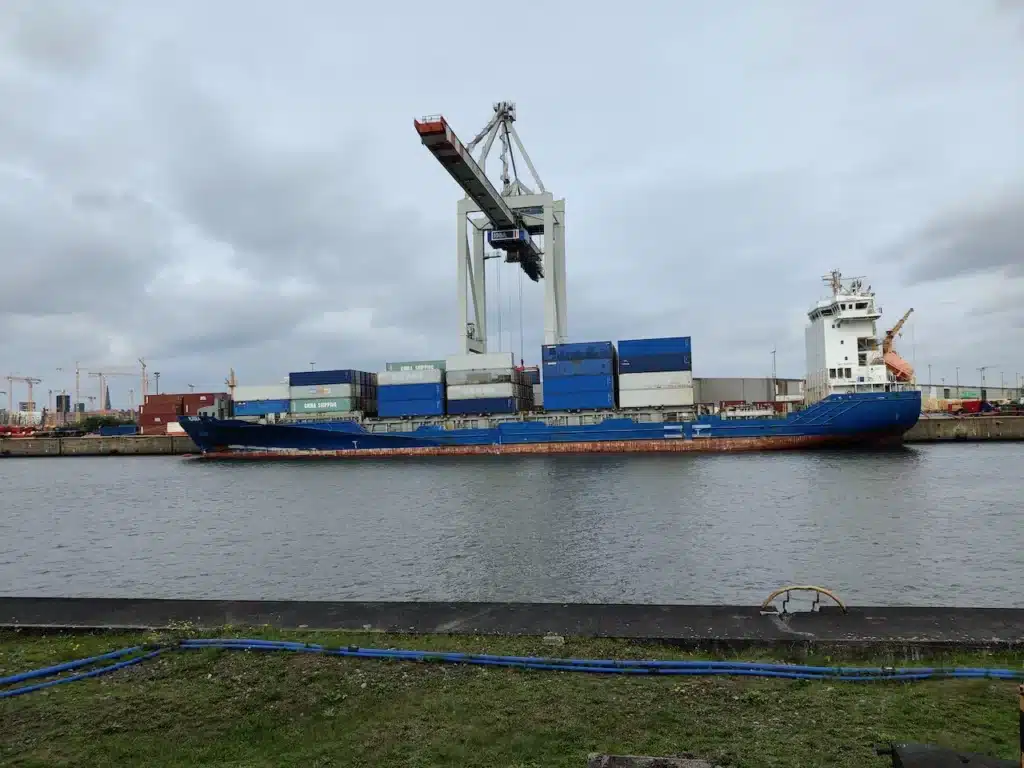
Nestled amongst the port of Hamburg, the sound of cranes loading containers of a different kind onto vast cavernous ships, I’m at my first in-person conference in about 18 months. It’s taking place on an old cargo ship, the HMS Bleichen (German), a ship obsoleted by the arrival of containerization and now home to talks about containers of a different kind.
The first talk of the event was from Hamburg Süd, a 150-year-old shipping company, that gave attendees a brief introduction to the world of shipping containers. Drawing some parallels to the containers we know (love?) and use, the arrival of a series of standards across the industry led to the logistical efficiencies we now enjoy when adding an item into a shopping cart from the comfort of our homes. The industry isn’t without its challenges though – the obstruction of the Suez canal by the Ever Given this year was a reminder of how dependent the world is on these inconspicuous ships criss-crossing the globe. I had never thought about how ships need to balance containers of different weights, sizes, contents, and contents. Like many other traditional industries, they’re looking for talented minds to help streamline these challenges.
With about 300 people in person (due to restrictions) and 1,000 online, Container Days is about sharing best practices and techniques rather than large product announcements. Here were my highlights.
I admit to being something of an old school stick in the mud, in that I like to use full desktop applications and work offline as much as possible. But I can’t help but notice the growing trend of usable web-based IDE tools and environments.
A talk from Christian Weichel and Jan Köhnlein of Gitpod shows you just how far the concept has come. Alongside GitHub codespaces, Visual Studio Code Remote, and many others with different implementation details, it’s a rapidly growing concept and workflow. Recognizing that not everyone wants to work inside a browser (hello 👋), one of Gitpod’s selling points is ensuring you get a similar experience in your editor of choice. The company also works hard to reinvest profits into the open-source projects they use, which is a big tick from me.
When you deploy with Kubernetes every day, it’s too easy to forget that it’s still not the most common method for thousands of companies and applications around the world. Two talks that were a reminder of this and how long migrations can take were from Sebastian Kister of Audi and Sebastian Herzberg of Free Now (a big multi-modal travel app in Europe). Both these talks outlined the need for understanding why you want to undertake such a migration and first ensuring that people are on board. Free Now ran workshops with all engineers to help them migrate services to suit Kuberentes (and the custom tool they created), which had the added benefit of reducing the resistance to change when they realized it wasn’t as hard as they thought.
As pointed out in Bill Muligan’s talk, the CNCF turned six this year, and Kubernetes itself is now seven years old. While for many, the thought of migration is still a strange idea and a long way off, to many (probably those reading this), Kubernetes is quite comfortable, and possibly almost “yesterday’s news.” Just before Bill’s talk was one from Hubert Ströbitzer of Kubermatic on seven common “sins” implementing Kubernetes. Some were more obvious, like setting resource limits, but others less so, such as the subtleties of the ENTRYPOINT parameter in container declarations. Returning to Bill’s talk, he laid out the plans of the CNCF to welcome new contributors, especially those outside of the USA. I have dipped my toes into some CNCF community activities and have generally been impressed with what I experienced.
Getting back to in-person (or hybrid in this case) was a mixture of feelings for me. I was reminded of what I enjoyed about conferences, such as meeting new people, experiencing new places, hearing case studies, and speaking directly to people to answer questions or problems. As a frequent solo traveler to conferences in the past, I was reminded that sometimes it was a bit tiring always having to introduce yourself to people who came with their teammates, something that online conferences handled slightly better. I was also reminded about how many talks at conferences in recent years come across as slightly oblique promotional talks. Online conferences didn’t escape this problem, but it was easier to switch away when you found yourself in one. But hey, I guess everyone is a bit rusty with in-person conferences.
Request a demo for an in depth walk through of the platform!